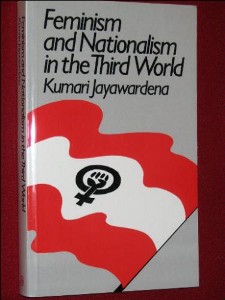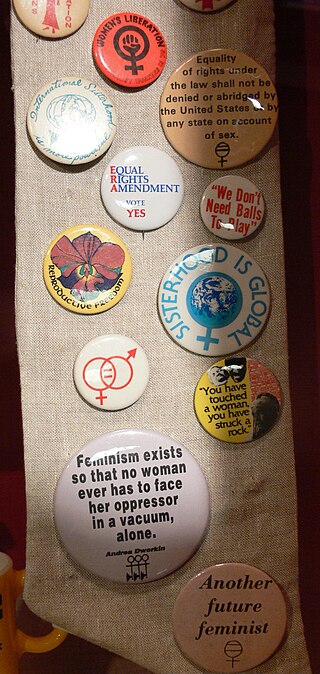Outlook on feminism

In the 1960s,Rowbotham together with Sally Alexander and Anna Davin and was one of the founders and leaders of the History Workshop movement associated with Ruskin College. [7] The History Workshop movement sought to write a "history from below" by focusing on the experiences of ordinary people by marrying the Marxist tradition of history-writing to the labour movement tradition. [8] Towards the end of the 1960s Rowbotham became involved in the growing women's liberation movement (also known as second-wave feminism);in 1969,she published her pamphlet Women's Liberation and the New Politics,which argued that Socialist theory needed to consider the oppression of women in cultural as well as economic terms. She was heavily involved in the conference Beyond the Fragments (eventually a book),which attempted to draw together democratic socialist and socialist feminist currents in Britain. [9] She was also one of the organisers of the National Women's Liberation Conference in 1970,which set out demands in relation to issues such as equal pay,education and free contraception. [10]
Between 1983 and 1986,Rowbotham served as the editor of Jobs for Change,the newspaper of the Greater London Council (GLC). [9] At this time she was also involved in the GLC's Popular Planning Unit alongside Hilary Wainwright,which was involved in developing democratic approaches to economic planning. [6] Since then,Rowbotham has produced numerous studies and articles expanding upon her theory,which argues that as women's oppression is a result of both economic and cultural forces then a dualist perspective (socialist feminism) that examines both the public and private sphere is required to work towards liberation.
Rowbotham was especially influenced by Marxist social history as practised by E. P. Thompson and Dorothy Thompson. [11] Combining a Marxist analysis with feminism,Rowbotham contends that capitalism not only systematically oppresses the working class,but also particularly oppresses women. [11] In her view,women are doubly oppressed as they are forced to sell their labour to survive,but also forced to use their labour to support their husbands and children. [11] Rowbotham is critical of traditional Marxist history for what she sees as the neglect of such issues as family history,the role of housewives in supporting the economy,sexuality,and maternity. [11] Rowbothbam argued that the traditional Marxist history by focusing on a class conflict missed sexual oppression. [9] Likewise,she has criticized those Marxists who contend that sexism did not exist in Communist societies with the claim that sexism was caused by capitalism as doing a disservice to history. [9] Rowbotham has argued that those Marxist historians who see women's history as a "distraction" from the main theme of the class struggle are presenting a misleading version of history. [9]
In her major early books Women,Resistance and Revolution (1972) and Hidden from History (1973),Rowbotham put her ideas into practice by examining the experience of women in radical and revolutionary movements in Cuba,Algeria,Vietnam,China,Russia,France and Britain from the 17th century to the 20th centuries. [12] In her opinion,working within the established order has never brought women any advances,and only through revolutionary socialist movements have women made any social gains. [12] Rowbotham has argued that though male revolutionaries are willing to accept women as partners as long as the revolution lasts,once the revolution is over,women are expected to return to their traditional roles. [12]
As an example of her thesis in Women,Resistance and Revolution,she examined the role of Russian women in the late Imperial,Provisional government,and early Soviet periods. [12] Rowbotham wrote that women played a key role in toppling Emperor Nicholas II and with him the House of Romanov,which had reigned since 1612,noting that the February Revolution in Petrograd began with women's demonstrations on International Women's Day. [13] Rowbotham has praised Vladimir Lenin and the other Bolshevik leaders in Women,Resistance and Revolution for legalising abortion,divorce,and contraception plus founding the Zhenotdel (women's department) together with socialised restaurants,health care and laundries. [12] Rowbothham argued that the changes experienced by Russian women from the Imperial era,where superstition,poverty,illiteracy,and the patriarchal view as women as property were the norm to the early Soviet era were an improvement. [12] She has criticised Soviet policies starting with the First five-year plan of 1928–33 for not only expecting women to work full-time,but also to take on the burdens of housework and child-raising while at the same time banning abortion and birth control. [12] Rowbotham argued that the Stalinist era marked the beginning of a retrogression for Soviet women,as Stalin to a certain extent brought about a return to traditional Russian values,most notably via a lavish personality cult that incorporated Tsarist imagery and iconography. [12]
Rowbotham has contended that to achieve women's liberation requires a "revolution within the revolution" or freedom from the "colony within the colony" as sexism was and is just entrenched in left-wing men as it is on the right. [12] In Women,Resistance and Revolution,she wrote that though women were allowed to participate in revolutionary events such as the French Revolution and the Chinese civil war,once a new order was established whatever under Napoleon or Mao Zedong,a retrogression to the previous patriarchal values took place. [9] Writing about the Vietnam War,which was then on-going,Rowbotham stated that Vietnamese women involved serving in the Viet Cong especially felt committed to the cause because of the dangers of rape from American GIs,from "massacres which none are spared" and the dangers of birth defects caused by the spraying of Agent Orange. [14] Rowbotham was one of the first to draw attention in the West to the fact that since spraying of the South Vietnamese countryside with Agent Orange herbicide stated in 1961,"an abnormally high percentage of miscarriages,stillbirths,and deformed children" had been born. [14] She maintains that capitalism and sexism/patriarchy are so closely linked that the only way to destroy both is a radical change in the "cultural conditioning of men and women,upbringing of children,shape of the places we live in,legal structure of society,sexuality and the very nature of work". [12] Rowbotham's books were,and are still well received in feminist circles, [15] and their accessibility has allowed them to remain popular.
In Hidden from History,she examined British women's history from the 17th century to 1930 from a Marxist viewpoint. [9] For Rowbotham,the history of British women could best be defined through class oppression,the Industrial Revolution,and sexism. [9]
In her 1973 book Women's Consciousness,Men's World,Rowbotham maintained that the domestic household work done by women was a part of commodity production as it allowed the production and reproduction of men's labour,thereby challenging a key tenet of traditional Marxist history. [9] However,she claimed that the human family was not just an instrument for disciplining and subjecting women to capitalism,but was a place where potentially humans could take refuge from what Rowbotham sees as the commodification of human relationships under capitalism. [9] In Rowbotham's view,raising children,sexuality,and the need for human relationships means that the family can rarely be reduced down to a service commodity. [9] Likewise,she argues for a Marxist history that accords equal importance to the role of both sexes in the history of revolutions,unions,political parties and protest movements. [11]
In Women's Consciousness,Men's World,Rowbotham presented her analysis of contemporary social conditions in Britain from a Marxist-feminist perspective. [15] She argues that origins of sexism predate capitalism,and that the institution of marriage closely resembles feudalism. [15] She contends that as in feudalism serfs were obliged to serve their masters,wives are likewise contracted to serve their husbands. [15] The historian Susan Cook praised Rowbotham for tracing a "female consciousness" in Britain from the 17th century onward through "complex webs" of economic and political change. [9] The clarity of Rowbotham's writing together with her picture of what Cook called the "potential contradictory nature of women's desires and needs" ensured that Women's Consciousness,Men's World reached a broad audience. [9]
In her 1977 book Dutiful Daughters,co-written with Jean McCrindle,Rowbotham interviewed fourteen women of lower-middle-class and working-class origin. [16] Though Rowbotham notes that the life stories of women interviewed for Dutiful Daughters were not intended to be representative of all British women,she argues that these snap-shots of different lives,if combined with enough other oral histories,can provide an understanding of the experience of ordinary women. [16]
As part of relating the personal to the political,Rowbotham has examined the sexual and political beliefs of such late 19th- to early 20th-century radicals as the gay rights activist Edward Carpenter,who saw socialism as way for humanity's spiritual rebirth,and the feminist Stella Browne who fought for the legalisation of birth control and argued for the importance of sexual pleasure for women. [9] Rowbotham argued that the political beliefs of Carpenter and Browne were closely tied to their personal lives. [9]
Besides her work as a historian,Rowbotham has been active in left-wing causes. [16] In her book Beyond the Fragments,co-written with Hilary Wainwright and Lynne Segal,Rowbotham called for the various fractions of the British left to unite,and work for a socialist Britain through grassroots activism. [17] She has great faith in activist social movements working from the bottom up to change society,and feels that historians have a duty to contribute to social change by writing books that expose what she sees as the evils of society. [17]
Placing Rowbotham as one (of three women) in her 2000 collection of Fifty Key Thinkers on History, Hughes-Warrington describes Rowbotham as a researcher who "draws upon a wide variety of sources including songs,novels,governmental and organisational records,pamphlets,other historical works and her own experiences" [16]
Hughes-Warrington noting her audience of ordinary men and women (and their history),considered it unsurprising that "she rejects much of the current literature of gender studies,Marxist theory and historiography. For her,the importation of French structuralist and post-structuralist perspectives have not only made academic writing inaccessible to the public,but have also discouraged academics from taking an interest in the developing world and in the life and work of people with different heritages from their own." [17]
Referring to Rowbotham's "The Trouble with Patriarchy", [18] Hughes-Warrington concurs with the need to have a clear idea as to what patriarchy is in order to struggle against it and quotes Rowbotham's definition in full. [15] She finds fault with those feminists who deny men a role in the battle against sexism. [15] In her opinion,women and men should stand equally against both capitalism and sexism to achieve radical social reorganisation. [19] In a 2011 interview,Rowbotham criticised Communism,claiming that Leninism "narrow the struggle of women's emancipation",and sees "libertarian socialism","ethical socialism" and anarchism as providing more vital understanding of women's needs. [20]






